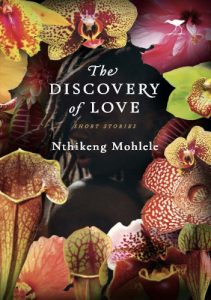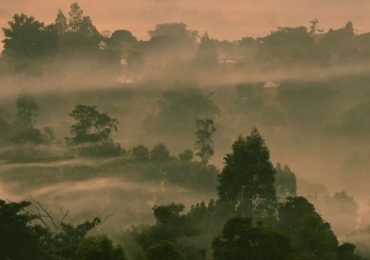The JRB presents an excerpt from The Discovery of Love, the new collection of short stories from Nthikeng Mohlele.

The Discovery of Love
Nthikeng Mohlele
Jacana Media, 2021
Read the excerpt:
Dinner with Dambudzo
I, around that time—1985 or thereabouts—telephoned The Robert & Grace Hotel in Harare and left several messages. Reception staff, various managers on duty, and friends who happened to be within earshot all said the same: it was and remained difficult to trace and meet with Dambudzo. He, except for when he was with some or other lover, had no fixed home address or what could remotely be considered a normal social diary. Mystery and a sense of awe surrounded him, a consistent thread of which was of a vagabond carrying a typewriter, a wad of crumpled manuscripts under his arm, often drunk out of his skull. It struck me that something was dangerously wrong: a combination of contested celebrity and substance abuse contrasted with, even with reported psychotic incidents, a volcanic mind that drilled into the deepest human marrow.
I heard that at some point he stayed with Flora, a German woman, that they were lovers—sort of, depending on who you spoke to—but that that relationship was, in many respects, only a fragment of a much grander life lived on the streets and in public parks. I lectured at the Makerere University for six years, on and off, before accepting a Head of Faculty position at the University of Tanzania. It was around that time, maybe the mid-eighties, that I first heard of The House of Hunger, a book I later read with utter astonishment and a sense of bewilderment, the full effect of which was mirrored only perhaps by the discovery of penicillin. Sure, I lectured on Soyinka and Achebe and Armah, also some James Baldwin and Augustino Neto for comparative effect, but I had not encountered thought, real thought: language and feeling with their skin ripped off, gently bleeding, the inner workings of membranes almost translucent, hypersensitive.
Events in Dar es Salaam proved brief and uninspiring, so much so that I spent no more than six months there of what was supposed to be a four-year stint. Remnants of nationalist sentiments swept through the continent, to places as far as China and Nicaragua. Liberation movements and the dawning of new national flags did not wholly cure the many ailments that afflicted the continent (including famine, coups, civil wars)—a boon for writers and other intellectuals that allowed them to, in varying degrees, reflect and comment on the comedy and excesses of the post colonies. It was a fascinating and often uncertain time, full of possibilities and dangers, particularly given the number of military governments that dotted the continent like islands. They imprisoned Soyinka and Ngũgĩ, killed Saro-Wiwa, and dissolved Lumumba’s remains in acid, while Nelson and others were imprisoned on Robben Island. It was out of these pockets of madness, out of the ashes of moments of revolutionary brilliance that the young man Dambudzo exploded onto the literary scene, first as a composed young sage and later as a rebel expelled from Oxford for setting his dorm room ablaze, gutting it.
I, upon reading The House of Hunger and a succession of equally compelling poems, was catapulted into ether by the devastatingly beautiful and ground-breaking prose, writing with a somewhat fragmented yet commanding directness that was at once both obscene and striking. I had, until that point, having spent two decades toiling in literary plantations, not yet encountered writing that brutal, that fragile, that timeless.
There was, in Dambudzo’s work, evidence of superior reading.
Born in Rusape, this was a young man with full lips and a hint of a looming frown. There were, over time, fewer pictures then than there are now: those The Voice T-shirt images, the combed baby Afro, then an attempt at dreadlocks and that promising young genius drunk and toothless following a tawdry brawl, I suspect. But, in that time of madness, that keening for progress, for principle, bullets and mortars for subjugation and bullets and poisons for survival, there was some enchantment: Bob Marley and the Wailers gave musical accompaniment to Rhodesia’s transition into Zimbabwe, a youthful-faced general who has since become legend proved that leaders could love and serve and respect their people, a life force that history now knows as Thomas Sankara.
We heard about these things, talked about them, argued over them. In that madness, some of it breathtakingly beautiful, the Marechera star had shot into the skies over Great Britain, where it continued to hover, causing cosmic and earthly turbulence for eight decades. The man who returned to Zimbabwe on an Air Zimbabwe flight, the one who kissed the airport tarmac on arrival, was visibly and evidently elated, intoxicated, shrouded in peripheral accusations that, he suspected, were a setup for arrest, just as had happened in West Berlin years earlier. I—as I observed him in the airport lounge, talkative but not necessarily coherent—knew that my notebook and tape recorder would be worthless, that I simply had to wait it out, for him to acclimatise and sober up, to sweat Britain out of his pores and breathe under Zimbabwean skies. An impromptu interview would not have worked.
From Harare, I flew to Jan Smuts Airport, wondering whether I had forsaken an opportunity to record what might have become one of the most iconic and historic literary interviews of all time. Yet I sensed a risk there, the possibility of erratic grandstanding, of fragmented and drunken brilliance that would not, in the end, amount to much. Maybe it was my own inadequacy, my lack of skill in understanding the multiplicity of minds: explosive minds, fragile minds, tortured minds, suspicious minds, dismissive minds, and lightning-fast minds broken in parts; minds that have refused known logic, refused to accept how humans have structured and convinced themselves that there are accepted ways for the mind to work, to be expressed.
In Johannesburg (Auckland Park, to be specific) I attended an interview at a now defunct newspaper, The African Sentinel. It was a bid to become deputy editor, with a view of full editorship once I had proven I could manage a fast-modernising newsroom. I had, before on-and-off stints in academic adventures, edited newspapers elsewhere on the continent. I settled in a three-bedroom flat in Yeoville, sought out emissaries—fellow academics, former students, reporters—to send to Zimbabwe to sniff out Dambudzo’s whereabouts, with a view to securing a face-to-face interview. The feedback was generally unreliable and often conflicting: that he had died, that he was imprisoned for sedition and public violence (which turned out to be complete nonsense), some honest enough to state that Dambudzo was increasingly becoming something of a phantom, living in the open with a fast-declining mind. One Frik Hendrik telephoned me six or so weeks after my interview with the Sentinel to inform me that background checks had revealed some dubious political publications and friendships not consistent with government priorities for the Republic. With a chuckle, a condescending chuckle, he added: ‘The South African government does not permit or tolerate nonsense at home or from elsewhere on the continent. A lot of people are yet to learn that, that we have no time for clowns, no matter how educated or well-known they think themselves to be.’ And that was that.
While I continued my Dambudzo fishing expedition I lived on irregular pension savings, some piecemeal teaching jobs and meagre and erratic book royalties. When it came to Dambudzo there were long bouts of silence, of no news, but I continued to harbour some fledgling hope that a moment would come when I would sit opposite him with a notebook and recorder to ask questions I had as yet not taken the time to compose. I knew I wanted to speak to him, to unearth and confirm the human, as opposed to the shadow that was increasingly becoming an urban legend, a spook of sorts, distortion upon distortion, like an accidental musical note that had turned into blaring but distant piercing noise.
~~~
- Nthikeng Mohlele was partly raised in Limpopo and Tembisa Township, and attended Wits University, where he obtained a Bachelor of Arts in Dramatic Art, Publishing Studies and African Literature. He is the author of six critically acclaimed novels: The Scent of Bliss (2008), Small Things (2013), Rusty Bell (2014), Pleasure (2016), Michael K (2018) and Illumination (2019).
Publishing information
The Discovery of Love explores and heightens one of the dominant themes in Mohlele’s literary oeuvre, that of love.
In this collection, love is reflected upon in expansive and unexpected dimensions. It becomes the backdrop against which Mohlele delves into the intricacies of human agency with profound and often unexpected effects.
These stories dazzle; they are wide-ranging in scope, yet particular in their authorial intent.





